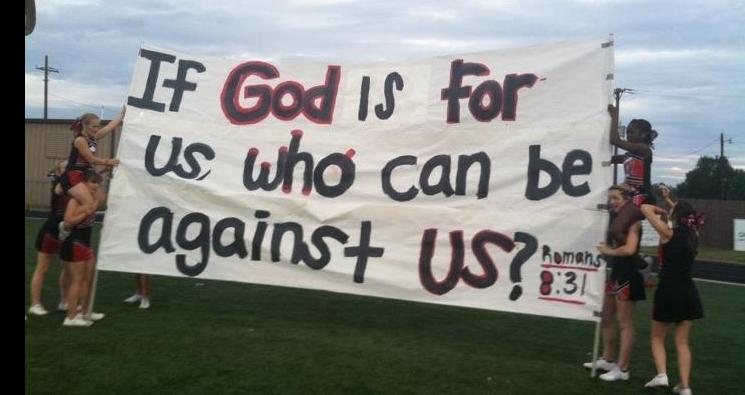Cheerleaders Allowed to Display Bible Verses at Football Games
A court has just ruled that high school cheerleaders who were banned by their school from holding banners with Bible verses have a constitutional free speech right to display those signs at football games.
The state court ruled that at least until the case goes to full trial next June, the students have a right to continue displaying the religious messages.
The Texas school district was dragged into litigation after complying with demands from the Wisconsin-based atheist group Freedom From Religion Foundation (FFRF). FFRF sent the school district a letter demanding that the students’ practice of holding signs with religious references for the football players to run through prior to the game be immediately stopped. Freedom From Religion Foundation argued that in their view allowing the students to display religious messages violates the Constitution.
The superintendent of the school district agreed and banned the students’ speech, saying, “I was advised that that such a practice (religious signs) would be in direct violation of United States Supreme Court decisions.”
The student cheerleaders filed a lawsuit against the school district arguing that the school was now violating their free speech rights. The judge initially agreed granting the students a temporary injunction against the school district’s ban. The judge has now extended that injunction through the end of the school year until the trial, scheduled for June 2013, begins.
Texas Attorney General Greg Abbot sought to intervene in the case in support of the cheerleaders’ rights, stating, “We will not allow atheist groups from outside of the state of Texas to come into the state, to use menacing and misleading intimidation tactics, to try to bully schools to bow down at the altar of secular beliefs.” Texas Governor Rick Perry stated, “Anyone who is expressing their faith should be celebrated, from my perspective, in this day and age of instant gratification, this me-first culture that we see all too often.”
The banners in question, reportedly selected by each cheerleader in turn, displayed Bible verses such as, "I can do all things through Christ which strengthens me," and "If God is for us, who can be against us." The Liberty Institute, which is representing the cheerleaders, argues that the banners in question are expressions of the individual cheerleaders' religious expression.
Freedom From Religion Foundation, which is not a party to the litigation, though it was their demand letter that sparked the lawsuit, went so far as to suggest that the school district “simply prohibit all run-through and on-field banners.”
This kind of inverted logic, not untypical of FFRF, would just assume shutdown decades of high school team spirit tradition than allow a Christian student to express her faith. Why not just shut down high school football altogether?
This is precisely the kind of angry atheist sentiment that we see time and time again from these groups: I’m offended, so ban the Pledge of Allegiance, censor “In God We Trust” from our money, and tear down the Ground Zero Cross.
While the Supreme Court has said that schools cannot sponsor and encourage religious messages at school functions, it has also said that students do not “shed their constitutional rights to freedom of speech or expression at the schoolhouse gate.”
This right extends to students’ free exercise of religion. Even the Supreme Court case relied on by FFRF and now the school district specifically states that while school sponsored or endorsed prayer at football games is unconstitutional, “[N]othing in the Constitution as interpreted by this Court prohibits any public school student from voluntarily praying at any time before, during, or after the school[]day.”
Ironically, Freedom From Religion Foundation has stated that they hope the school district “drops this” because, “what we would like to do is sue the school district, but we have to have a plaintiff.” FFRF goes on to complain that it is difficult to find someone in this predominantly Christian community who is offended by the students’ religious speech.
We will continue to follow this case as it continues to trial, and are pleased that these students are once again permitted to exercise their constitutionally protected rights to free speech and religious expression.
